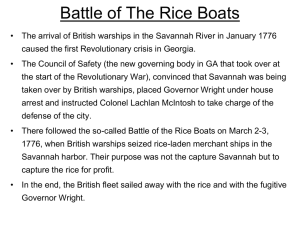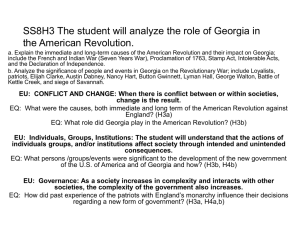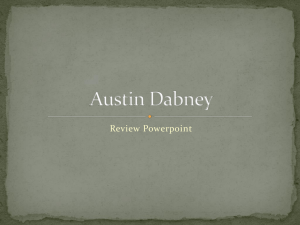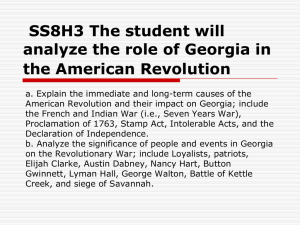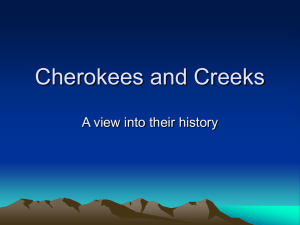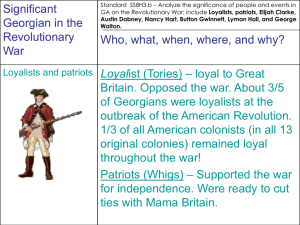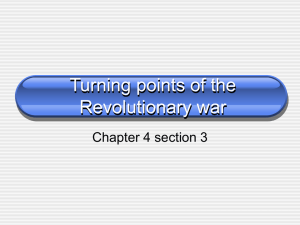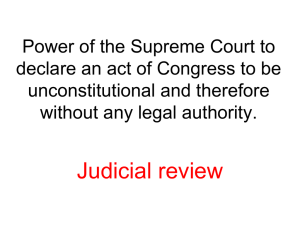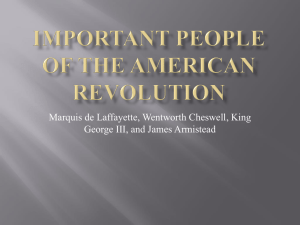The Battle of Kettle Creek
advertisement
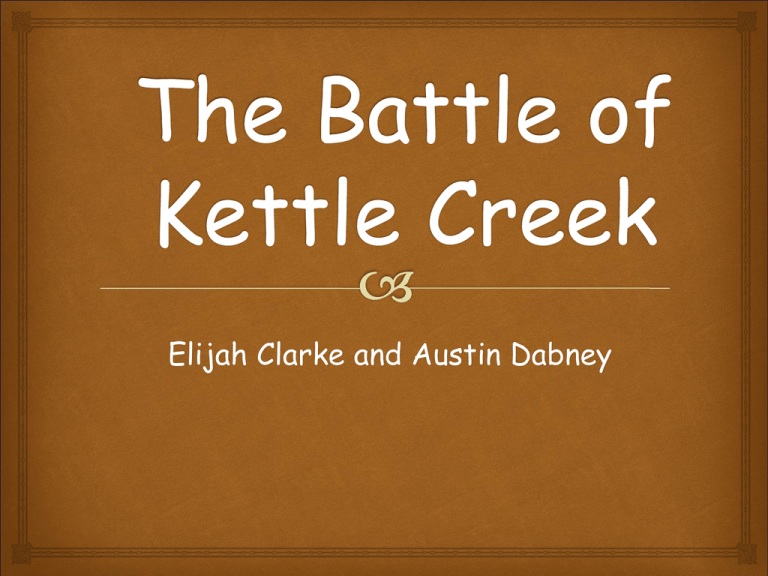
Elijah Clarke and Austin Dabney Battle of Kettle Creek Took place on Sunday, February 14, 1779 On that morning 600 Loyalists (a.k.a.Tories) led by James Boyd, were camped on a hill along Kettle Creek. They were following a trail trying to get to Augusta. Boyd was assigned to recruit southerners who were loyal to the British. At the same time 340 South Carolina and Georgia militiamen, under Colonel Andrew Pickens of South Carolina and Colonel John Dooly and Lieutenant Colonel Elijah Clarke of Georgia, were preparing to attack Boyd's camp at Kettle Creek. Battle of Kettle Creek Pickens led his 200 men in a direct assault on the rocky hill on Kettle Creek, while Dooly and Clarke attacked the camp across the creek on the left and right. Pickens's advance guard disobeyed orders and fired on the Loyalist sentries, announcing the attack. Boyd led his men in ambushing Pickens's troops while Dooly's and Clarke's men were entangled in the swamp. Battle of Kettle Creek Boyd was shot. With their leader down, the Loyalists panicked and were driven across the creek. Boyd and nineteen of his men were killed, and twenty-two others were taken prisoner. Counting the Loyalists who went home and later surrendered to local authorities, about 150 of Boyd’s men were eventually taken prisoner. Battle of Kettle Creek Boyd and the British had expected thousands of loyal southerners to join the cause and restore Georgia back to the king. Boyd was unsuccessful… many men that joined him were criminals trying to escape or were threatened with their lives and property. Battle of Kettle Creek The Battle of Kettle Creek was a victory for the Patriots. The battle raised the morale of the Georgia patriots. The patriots were able to take needed supplies such as weapons and horses from the loyalists. Elijah Clarke One of the more well-known Georgia patriots was Lieutenant Colonel Elijah Clarke (1742-1799). Clarke was a poor farmer from North Carolina who moved to Georgia around 1773. Early on Clarke wanted to remain loyal to the king and even signed his name to a petition to support the King in 1774 However, he quickly joined the Georgia militia when the fighting broke out in the colony. Early in the war Clarke fought both the Creek and Cherokee who had sided with the British. Elijah Clarke at the Battle of Kettle Creek Clarke’s most famous act was his leadership during the patriot victory at the Battle of Kettle Creek. During this battle, Clarke led a charge against loyalist troops that helped win the battle and boost morale for the Georgia patriots. After this battle, Clarke led guerilla fighting against British troops in Georgia and South Carolina. Clarke After the War Clarke was wounded several times during the Revolution. The state of Georgia rewarded his services with a plantation. After the war, he continued to serve in the military and was involved in politics. Based on his military accomplishments, Clarke County was named in his honor. Clarke’s Downfall Unfortunately, Clarke’s heroic legacy was scarred by a bad choices in his later life. In 1789, he tried to create his own republic, called the “Trans-Oconee Republic,” after defeating the Creek Indians in present day Walton County. He was also involved with the Yazoo Land Fraud, and became entangled in two plots to illegally invade East Florida. Clarke died in 1799, discredited and almost bankrupt. Austin Dabney Austin Dabney (1765-1830) was a slave who fought under Elijah Clarke during the Battle of Kettle Creek. Dabney served in the place of his master Richard Aycock, who used Dabney as a substitute in order not to fight himself. Austin Dabney at the Battle of Kettle Creek Dabney is thought to be the only African American who fought at the Battle of Kettle Creek. He was an artilleryman and was severely wounded during the fighting. Dabney’s Road to Recovery One of his fellow soldiers, Giles Harris, took Dabney to his home and cared for Dabney while he recovered. Harris’s kindness fostered a close bond between Dabney and the Harris family, who Dabney continued to work for after he was granted his freedom. Dabney even paid for Giles Harris’ son’s college expenses at the University of Georgia. Dabney After the War Due to his bravery during the Battle of Kettle Creek, the state of Georgia paid for Dabney’s freedom from his former master. The state also gave Dabney a grant for 50 acres of land for his service during the Revolution, the only African-American to receive one. Later, Dabney received an additional 112 acres from the state and a federal “invalid pension” of 60 dollars a month (which was increased to 96 dollars a month) due to the wound he received at Kettle Creek.
